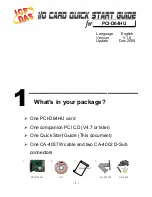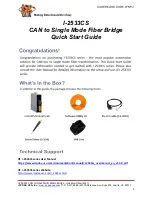
The Niagara-7000AP owner’s manual contains considerable information to ensure optimal performance, troubleshoot both common
and rare system interactions, and is a great primer to the technology that makes this unit so unique. However, we appreciate and
respect your valuable time. So, for those so inclined, we humbly ask that you (at the very least), follow this quick-start guide.
¡
¡
If the Niagara-7000AP has been exposed to excessive rain, flooding, fire, or it has sustained considerable physical damage, we
ask that the unit be returned. Do not attempt to connect equipment to it, or; energize the unit!
¡
¡
The power source to which the Niagara 7000AP is connected should be 220-240VAC single phase nominal voltage, 16 amps
(current capacity RMS). However, the Niagara 7000AP will operate very well with a 10-amp service outlet. For proper operation,
the Niagara 7000AP requires a safety ground (supplied via the power utility AC wall outlet).
¡
¡
The Niagara 7000AP may be placed on any table, cabinet, shelf, or floor. When rack-mounting is required, the four threaded
feet may be removed with a standard Phillips screwdriver. Placement or proximity to other components is not critical, and,
under standard use, the Niagara 7000AP does not produce any appreciable heat.
¡
¡
Once the Niagara 7000AP is placed, an appropriate 16-amp-rated AC cord must be connected to the rear panel AC inlet
(IEC-C20) connector. The AC cord must have an IEC-C19 female-end connector and a grounded male UK-1 13P, Schuko, or
NEMA-15P (Edison) plug depending on the preferred or available AC service outlet. Ideally it should be an AudioQuest for
best performance and proper Ground-Noise Dissipation.
¡
¡
Connecting AC cables to the Niagara 7000AP’s NRG Edison AC outlets –
WARNING!
The AudioQuest NRG-Edison AC
outlets feature the strongest grip of any commercially available AC outlet in history. They will still require slow and careful
“wiggling.” When either inserting a plug into these receptacles or removing an AC cord’s male plug from the receptacles,
gently move the male AC cord’s plug from side to side while providing an even forward or backwards pressure.
¡
¡
High Current/Low-Z Power Banks: There are two High Current/Low-Z Power banks (labeled “1” and “2”) with two AC outlets
each. The outlets feature our Transient Power Correction Technology, and are designed to enhance the performance of power
amplifiers via our circuit’s low-impedance transient current reservoir. Power amplifiers, mono-block amplifiers, integrated
amplifiers, powered receivers, or powered subwoofers should only be connected to these four outlets.
¡
¡
Power Correction Switch: This rear panel mounted switch MUST be set in the ENGAGE position, regardless of the equipment
that is connected to the Niagara-7000AP (line-level, digital, video components or power amplifiers). It may not function
properly otherwise. See user manual set-up for more detailed information if necessary (otherwise please place this switch in
the ENGAGEE position).
¡
¡
Ultra-Linear Noise-Dissipation System/Dielectric-Biased Symmetrical Power Banks: These are for all line-level, digital,
and video products (typically). There are four banks that utilize this technology within the Niagara 7000AP. Further, the first
two banks (3 and 4) are 100% isolated from banks 5 and 6.
¡
¡
I hear a slight buzzing sound coming from the Niagara 7000AP. Is it damaged? No, it’s not damaged (or, at least, damage
is very unlikely). If you’re in an extraordinarily quiet room and you hear this buzzing sound only when in relatively close
proximity to the Niagara 7000AP, or only when you place your ear next to the unit, the buzzing is normal and cannot be
entirely eliminated. Although, in some cases it can be considerably reduced via careful routing of one or more component
power supplies that have a severely clipped AC waveforms, and moving them to the adjacent Symmetrical Power Bank, or at
times the High Current Bank. See the Niagara-7000AP manual for detail information about
magnetostriction
.
¡
¡
Optimizing the polarity of the AC cords. Please use an AC polarity checking device whenever possible (for Schuko plug
AC cords). Plug this device into one of the high current outlets (1-2-3-4) only (symmetrical outlets will not register properly).
Reverse the plug orientation of the incoming AC cord to the Niagara-7000AP, if the polarity check device shows reversed
polarity.
Quick-Start Guide
N
iagara
7000aP
Low-Z Power
|
Noise-Dissipation System




















